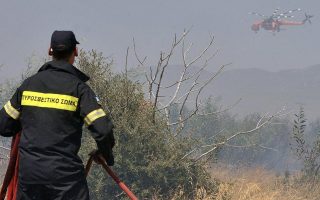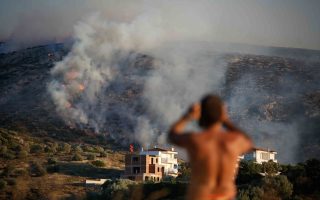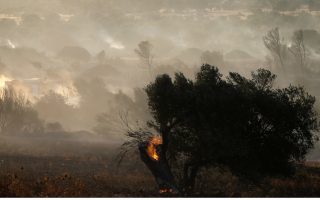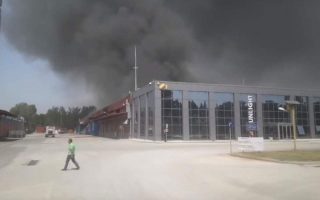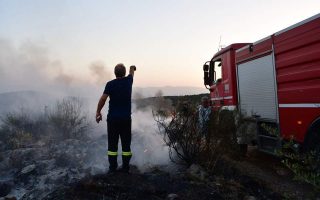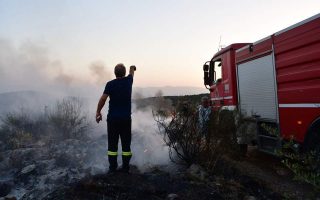The deadly Ilia wildfires, 10 years later
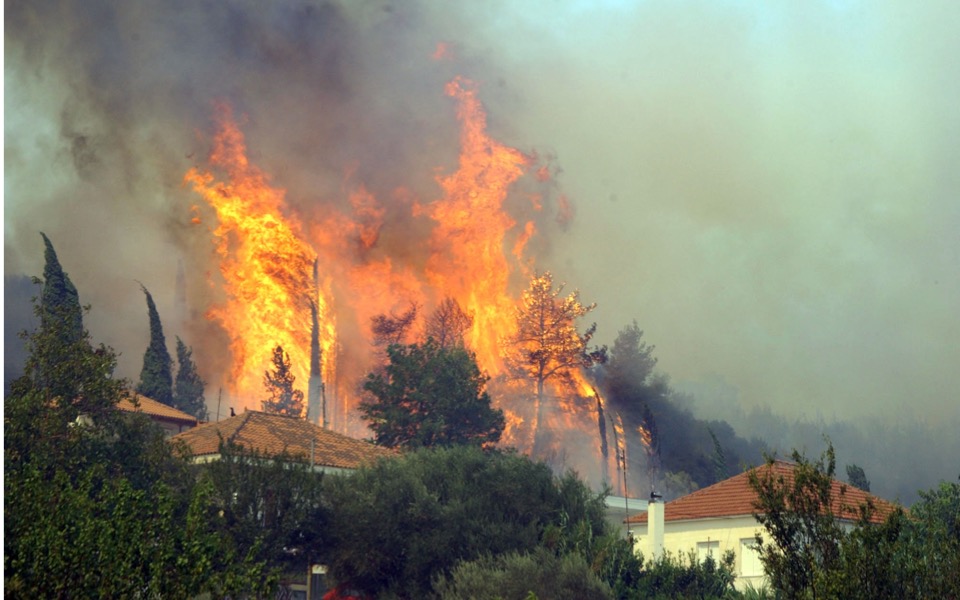
She remembers being woken up by the air-conditioning unit coming to a sudden halt, mid-siesta. Then her sister called, saying she could see from several kilometers away that the woods were on fire. One of the first things Ioanna Pappa did was throw the cooking gas canisters she had in her house into a cistern with irrigation water. “I felt my face burning as soon as I went outside and heard a sound like a hurricane, like a herd of galloping horses,” she says. “I felt like I was burning up even though I couldn’t see the fire yet. When I got closer, I saw that the flames were as high as a six-story building.”
Pappa, some of her family and fellow-villagers at Smerna managed to get away. Her parents’ remains, however, were found a few days later on the outskirts of the village. They were among the 36 people killed in a raging forest fire that struck the Peloponnesian prefecture of Ilia on August 24, 2007. Though the 10-year anniversary of that tragic day is just around the corner, much about the incident remains unresolved.|
Compensation for the families of the victims is one such matter. The law firm of Antonis Fousas represents 22 families who have sued the Greek state separately for damages. Three of the suits have been settled and the families are due to receive their compensation by the end of 2017 while another six are at the stage just before being settled. But the other 13 are still at the Administrative Court of First Instance in the town of Pyrgos. A decade on and they’re yet to progress from the first stage.
Judicial nightmare
Pappa describes the judicial process after the fires as a nightmare, especially the criminal part, which was wrapped up in 2015 when the Supreme Court upheld a ruling by the Court of Appeals convicting the former regional governor of Ilia, Haralambos Kafyras, and former Zacharo mayor Pantazis Chronopoulos to 10 years in prison, which could be paid off rather than serving their sentences.
They were convicted for failing to take the necessary measures to contain the fire’s toll. The same court also upheld the convictions of a fire warden who did not act in a timely manner and the woman who owned the house where the fire started.
According to the Supreme Court’s 270-page argument, which has been seen by Kathimerini, errors and negligence occurred before and during the fire. Until August 2007, the region of Ilia comprised forests, farmland and residential areas that were all jumbled together without any clear boundaries separating them.
According to judges, the forests had not undergone any clearing or maintenance since 1980 and had been left to grow wild and impassable, with a thick ground cover of dead brush, dry leaves and twigs – perfect kindling. The summer had also been particularly arid, with high temperatures, low rainfall and strong winds, all conditions that pointed to the need for preventive action.
“I remember people clearing firebreaks at some point in the past but then it stopped,” says Pappa. “And the roadsides were overgrown with weeds.”
The Supreme Court found that authorities had been negligent about clearing dead brush and the entire road network, particularly in the areas of Smerna and Mount Lapithas, which were especially vulnerable to fire and extremely craggy and steep, meaning that not only were these areas hard for firefighters to reach, but the flames were able to climb the slopes.
The judges also agreed that the public was not adequately informed of the dangers once the wildfire started. According to the court ruling, publications in local papers are not enough and people need to be informed verbally, with announcements over loudspeakers by municipal officials and police patrols across the region.
The fire started on August 24 in a house in the village of Paliochori, where a 77-year-old woman was cooking a dish traditionally served at funerals for her husband’s memorial. Beside the gas cylinder she used for cooking and left unattended, the woman had stored tins containing 800 kilograms of olive oil as well as a second gas cylinder.
At the time, there were winds reaching 7 Beaufort and the temperature was 41 degrees Celsius. The woman’s family noticed the fire at 2.15 p.m. but their efforts to bring it under control failed as the flames grew because of all the flammable material in the kitchen and the blaze spread outside the residence’s walls.
The evidence shows that 26 people died between 3.45 and 4 p.m., the majority trapped in their vehicles on the country road between Zacharo and Artemida.
“The plans were activated in piecemeal manner and most of the agencies were informed from random and disparate sources, approaching the incident without any exchange of views, coordination, communication, cooperation or planning,” the judges argued. They also noted that independent initiatives by different agencies on that day effectively gridlocked the civil protection mechanism.
The day after
Researchers investigating the area’s post-fire rehabilitation three years after the events of August 2007 found evidence of a lack of coordination, tangled red tape and delays in the disbursement of approved funding for the reconstruction or repair of damaged buildings. Christina Papageorgiou, a postgraduate geology student, Aikaterini Chronopoulou-Sereli from the Agricultural University of Athens and Gavriil Xanthopoulos, a researcher at the Forest Research Institute of Athens, found in 2010 that the rehabilitation initiative was fragmented and disorganized, and that measures were “aimed at covering immediate needs and delaying a more serious approach to the issue.”
Today, on the issue of prevention, Deputy Regional Governor for Ilia Giorgos Georgiopoulos tells Kathimerini that funding for clearing woodland and creating fire roads usually reaches municipal authorities after long delays, even in the middle of the fire season – and is not that much to begin with. He adds, however, that the fire service is much more experienced now and that money has been set aside by the authority to hold a tender for equipping the service with a modern fleet of fire trucks.
In 2007, after the Ilia fires, a new institutional framework (which was revised in 2014) was designed on how evacuations are decided and coordinated during a wildfire. Based on these instructions, the decision to evacuate rests with the municipal authority or with the regional authority if the disaster affects more than one municipal unit.
Information is key
Speaking to Kathimerini as the 10-year anniversary of the fire approaches, Civil Protection General Secretary Yiannis Kapakis stressed the importance of prevention and coordination between agencies in managing natural disasters. Informing the public is also instrumental, he said. “You need a systematic and targeted information campaign. We are moving in this direction already and have made significant progress,” he added.
Xanthopoulos, of the Forest Research Institute of Athens, also believes that preparation is key. On the institute’s website (www.fria.gr), the scientists have created a form for evaluating the fire risk of properties near woodland so that residents can take preventive action such as clearing their own and nearby areas of weeds and brush.
No warning
Pappa says that no one had warned them of the danger of a wildfire 10 years ago or provided them with any guidance during the blaze. “No one came to alert us. If my sister hadn’t called, we would have burned to death inside the house.”
She was asked to identify the remains of her parents, Vassilis and Vassiliki, at the Rio hospital, but only DNA tests were able to provide a positive match. At the hospital in the western Greek town she met with psychologists who “tried to embrace people,” but the victims’ relatives were not provided with any counseling or support afterward.
Pappa is not sure whether a hug would have helped. “There was so much anger, so much pain, rage and even hatred,” she says. “Time may make some of the pain go away, but every August 24, it comes back.”
